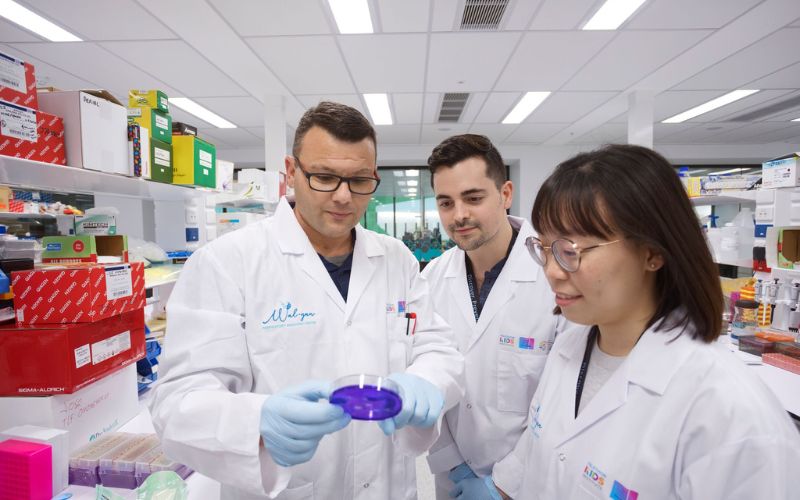
- Patients with lung infections that are not responding to antibiotics will be treated with phage therapy as part of a new translational trial program.
- This will be the first time that a coordinated, standardised approach to assess the effectiveness of phage therapy for treating antibiotic-resistant pseudomonas lung infections in humans has been undertaken.
- There has been a lack in the development of new antibiotics since the last novel antibiotic was discovered in 1987. Individuals with antibiotic-resistant bacterial infections need alternatives to antibiotics to fight against the harmful bacteria that cause these infections – a powerful new weapon is phage therapy.
Patients with lung infections that are not responding to antibiotics will be treated with phage therapy as part of a translational trial program to be undertaken by world-recognised experts in this field.
The three-year program, to be led by Associate Professor Anthony Kicic from the Wal-yan Respiratory Research Centre – a powerhouse partnership between The Kids Research Institute Australia, Perth Children’s Hospital Foundation and Perth Children’s Hospital - and Curtin School of Population Health, has received $1,972,632 funding under the Federal Government’s Medical Research Future Fund.
The World Health Organisation has named antimicrobial resistance as one of their top global health priorities, which they predict will cause over 10 million deaths every year within the next 30 years if nothing is done.
Antimicrobial resistance occurs when bacteria such as pseudomonas develop ways to resist antimicrobial medicines, such as antibiotics. These resistant bacteria then grow causing very bad and uncontrolled infections.
The last novel antibiotic was discovered in 1987 and there has been a lack in the development of new antibiotics ever since. Individuals with antibiotic bacterial infections need alternatives to antibiotics to fight against the harmful bacteria that cause these infections – a powerful new weapon is phage therapy.
Phages are specialised viruses that only kill certain bacteria. They can be found everywhere in the environment, including in waterways and soil.
Phage therapy is the treatment of bacterial infections using specific phages. First, the bacteria causing the infection is used to identify which phages can treat it. When matching phages are identified they are cleaned thoroughly so that they can be safely given to humans.
Associate Professor Kicic said this trial will be the first time that a coordinated, standardised approach to assessing the effectiveness of phage therapy for treating antibiotic resistant lung infections in humans has been undertaken.
“Excitingly, ethics approval for the national implementation of compassionate use of phages has been granted. This means that patients experiencing chronic, recurrent lung infections no longer responding well to antibiotic treatment can now trial phage therapy as a treatment option.
“We have assembled a team of world-recognised experts, who will be using a systematic and tailored approach to develop effective and safe phage treatments for use in the very ill patients,” Associate Professor Kicic said.
Using a precision medicine approach, we will identify, prepare and deliver inhaled phages tailored to each individual’s need. We will then monitor the safety, tolerance and effectiveness of the treatment.
Although this trial will focus on treating antibiotic-resistant lung infections caused by pseudomonas, phage therapy can also be used to treat other common bacterial infections like "Golden Staph", skin and ear infections, and in any situation such as surgery where antibiotics are becoming less effective because of bacterial resistance.
The trial will be carried out in partnership with The Kids Research Institute Australia, Sir Charles Gairdner Hospital, University of Sydney, Curtin University, and the Institute for Respiratory Health.
The Medical Research Future Fund grants were announced by Minister Mark Butler. Read the Minister’s media release here
